
ďAll
my life I wanted to be somebody - and here I am!
I know what I've got and there ain't nobody gonna take it away from me!Ē
So goes the intro to ďThe Wild One,Ē
a song thatís become the theme of a Rock icon. Detroitís original Riot
Grrl,
Suzi Quatro,
celebrated her 70th year on a planet that wasnít quite ready for her.
Screaming lyrics to make the nuns faint, thumping her oversized bass and
dominating the stage in skintight leather catsuits, the petite singer
and bandleader defied the world to put her in a corner.
The documentary,
SUZI Q, is a
celebration and no-holds-barred exploration of the multifaceted
innovator with over 50 years in the business.
Quatro
chatted exclusively with
The Lady Miz Diva
about battling sexism, family pressures, press disparagement, and an
industry only too happy to cast her aside, to swing her Fender Precision
bass through the Rock ceiling and change the game for female musicians,
everywhere.
Dig it!
SUZI Q
Suzi Quatro
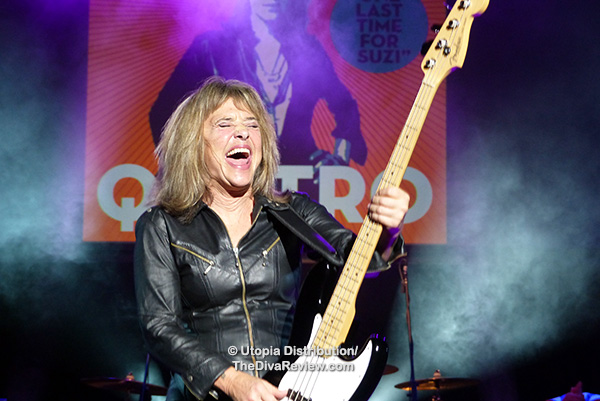
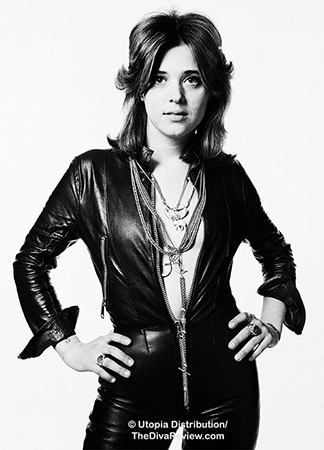 The
Lady Miz Diva: Ms. Quatro, I feel like Iíve been waiting for the SUZI Q
documentary for a very long time. I know that seeing that wee lady in
the black leather jumpsuit and enormous bass, on HAPPY DAYS, who was
cooler than The Fonz, helped make a bass player out of me.
The
Lady Miz Diva: Ms. Quatro, I feel like Iíve been waiting for the SUZI Q
documentary for a very long time. I know that seeing that wee lady in
the black leather jumpsuit and enormous bass, on HAPPY DAYS, who was
cooler than The Fonz, helped make a bass player out of me.
Suzi Quatro: Just cos you started off that way, Iím going to jump straight in there. Itís so strange; the film has, for me, highlighted stuff that I never really thought about or realised. Seeing your life on the big screen, the mouth hangs open. You go, ďWhat?Ē to the bad stuff and the good stuff. Sometimes you want to crawl out, sometimes you sit and watch; but what I realised -- including you, you made me think of it -- I knew, obviously, that I was the first one out there, so I didnít have the blueprint. I had to make it up myself. It was very much me sticking to my guns, letting nobody change me; being out there with the bass guitar and leather jumpsuit. I didnít know what I was doing, but I was doing it.
I was simply being stubborn and sticking to me, okay? Thatís all. And then, later on, like six or seven years later, as other girls started to come through and I started to hear the compliments, then I started to think, ĎOh, oh, I guess I did that?í Now, though, now at the age of the 70 watching this movie; itís really made me reevaluate it.
First of all, itís humbling. It makes me teary-eyed, because when you donít set out to do that, and you do that, itís just something. But what I realised talking to all the girls, for instance, Cherie {Currie of The Runaways} -- sheís a good friend -- she gave me an award at She Rocks in January, and she went up to give this speech and she started to cry. Then the other day, with Cherie and {The Go-Goís bassist} Kathy Valentine, we three did an interview on Zoom, and Kathy Valentine starts to cry. Then I had my friend over, I donít know if you remember a band called The Baby Animals? Their lead singer, Suze DeMarchi, sheís been a big fan all her life. We made friends in Australia, we did lots of tours together, and she ended up coming here not that long ago. I took her up into my ďEgo Room,Ē because itís one of the things that everybody likes to see, and she started crying.
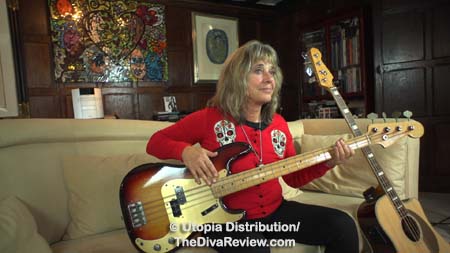 So,
what Iíve now assimilated in my little brain -- and then it makes me
cry, it really does -- is that without meaning to, just by sticking
religiously to who I am, and not compromising for anybody any fucking
day of the week -- I do not compromise, okay? You can walk away, go
ahead, I am me. Anyway, what I realised is, that by sticking to me, my
path; my journey was supposed to be exactly what I did. I was supposed
to give women who didnít know where they belonged, permission; that
thatís okay, cos they belong here. Because I didnít fit anywhere; you
see me in the film, ĎWhere do I belong?í And then by me going through
the pain and everything I had to go through, I had opened the door, and
then I said to other women, ďItís okay. Youíre okay.Ē
So,
what Iíve now assimilated in my little brain -- and then it makes me
cry, it really does -- is that without meaning to, just by sticking
religiously to who I am, and not compromising for anybody any fucking
day of the week -- I do not compromise, okay? You can walk away, go
ahead, I am me. Anyway, what I realised is, that by sticking to me, my
path; my journey was supposed to be exactly what I did. I was supposed
to give women who didnít know where they belonged, permission; that
thatís okay, cos they belong here. Because I didnít fit anywhere; you
see me in the film, ĎWhere do I belong?í And then by me going through
the pain and everything I had to go through, I had opened the door, and
then I said to other women, ďItís okay. Youíre okay.Ē
This seems to be whatís happening with this documentary, and itís running away like a train, and I canít stop it.
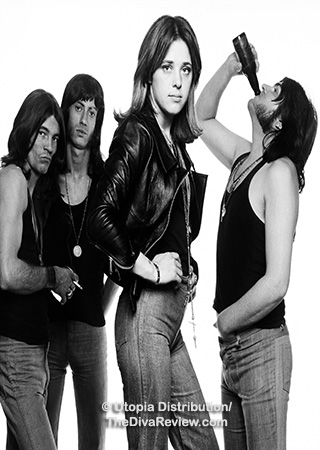 LMD:
Itís cathartic if you are female bass player or rock musician. Itís
cathartic if youíve ever been the odd one out. Itís cathartic if youíve
never been a girl whoís ďgirly,Ē or followed the accepted ďgirls
rules.Ē And all of that is encapsulated in one petite powerhouse from
Detroit.
LMD:
Itís cathartic if you are female bass player or rock musician. Itís
cathartic if youíve ever been the odd one out. Itís cathartic if youíve
never been a girl whoís ďgirly,Ē or followed the accepted ďgirls
rules.Ē And all of that is encapsulated in one petite powerhouse from
Detroit.
I have to know where that tunnel vision comes from? That clear laser beam focus that allowed you to know exactly what you were supposed to do and run toward it like a freight train?
SQ: And it still is! Nothingís stopping me. I will not let anybody stop me. This is my advice for people -- not just women -- people -- if you have a vision, go there! Go!
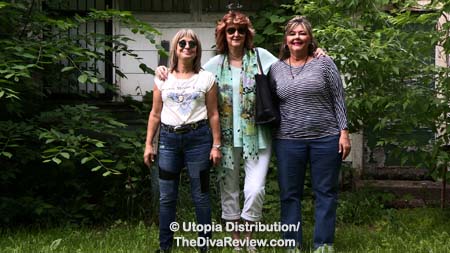 One
of my sisters says -- and everythingís fine, I give them their platform,
I didnít edit them out, I let everybody speak how they wanted to speak,
I wanted this to be honest, and it is. I didnít mind the ups and the
downs, I didnít mind the cringes; everythingís fine -- but one of my
sisters said one thing that bugged me, because I didnít understand it.
She said, ďOh, yeah, yeah, yeah, sheís just gonna keep going. Sheís not
gonna let anybody stop her, not her kids, not her husband, not her
family.Ē And I went, ĎWait a minute. Why would you stop me?í Iím
sorry, it doesnít compute, why would you stop another human being from
doing what theyíre doing? Iím not hurting anybody. Iím following
my path, you know?
One
of my sisters says -- and everythingís fine, I give them their platform,
I didnít edit them out, I let everybody speak how they wanted to speak,
I wanted this to be honest, and it is. I didnít mind the ups and the
downs, I didnít mind the cringes; everythingís fine -- but one of my
sisters said one thing that bugged me, because I didnít understand it.
She said, ďOh, yeah, yeah, yeah, sheís just gonna keep going. Sheís not
gonna let anybody stop her, not her kids, not her husband, not her
family.Ē And I went, ĎWait a minute. Why would you stop me?í Iím
sorry, it doesnít compute, why would you stop another human being from
doing what theyíre doing? Iím not hurting anybody. Iím following
my path, you know?
So, what gave this to me was probably, I guess, growing up in a big family. It was a loving family, donít get me wrong; I love everybody very, very much. Everybody has said they can see through the film, that family is hugely important to me. Huge! But unfortunately, Iíve always felt like -- whether I was or not is incidental -- because this is how I felt, and itís always your perception that counts. I felt like a square peg in a round hole. I wasnít a makeup girl. I played with the boys. I played soldiers. I just wasnít like everybody else. And I needed to find my voice, and I knew what my voice was real young.
I knew I was an entertainer. I knew I was Elvis from age 6. Thatís who I had my lightbulb moment with; I looked at him on TV and watched him with all my sisters screaming, and Iím a little girl, and Iím going ďWhy are you screaming?Ē And then I looked into the TV -- every time I tell the story it amazes me that it happened to me at that age -- but I donít bullshit, Iím not a bullshitter -- it was during ďDonít Be Cruel,Ē I went into the screen, just drawn in, and a lightbulb went ďbing!Ē and I went, ďIím going to do that.Ē And other people have had that with me. And you know, even not to think about the fact that he was a guy and I was a girl; it didnít even compute.
So, I donít do gender, I donít do it very easily, as I think Donita Sparks {L7} uttered in the film. I donít do gender. In fact, the only time I will pull my female card -- and I will -- I keep it in my back pocket, you know, like a penalty card? When one of the guys or somebody steps just a bit over the line of my sensibilities. There are words, there are a few words I will not hear. You probably know what some of them are; one of them starts with a C.
LMD: I have a feeling I know what youíre talking about, but you live in England, where that word is pretty much a greeting.
SQ: A lot of people use it, but if itís said in my vicinity, out comes the female card. They wonít say it in front of me. And if they do, they only do it one time. Because I pull the card out, and I say, ďExcuse me,Ē and they stop. I call time, off the field, give me your balls. {Laughs} Iíve got all the balls, anyway.
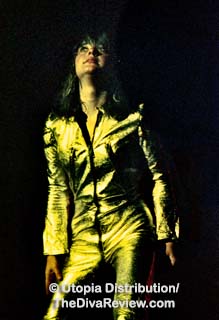 LMD:
Oftentimes, artistsí documentaries show us art born out of tragedy, or
some sort of struggle or dysfunction. As we just
said, you come from a very loving, ďnormalĒ upbringing.
LMD:
Oftentimes, artistsí documentaries show us art born out of tragedy, or
some sort of struggle or dysfunction. As we just
said, you come from a very loving, ďnormalĒ upbringing.
So, was it that Elvis ďlightbulbĒ moment, or the fact that your father was a musician that brought you up to love music, that made it possible for you to have that forward vision doing what you knew you were meant to do, without losing your mind?
SQ: I didnít lose my mind, ever. No I didnít. I have unassailable instincts that I trust. Iím like one of those cavemen, you know? That somebody walks in the cave and I know if itís bad or good. I keep that instinct in me, and I trust it so much, I donít even need words. I just know what I want. Thatís a good question.
It was a loving family. I knew my path very early on, as I said. I knew that I had entertained very early on. When I went to do my bit in the family shows, everything got quiet and everybody watched, and in my little heart I went, ĎI can do this.í I knew I could do it anyway, I used to walk around in school when I was like 10 -- this memory just came to me -- I remember the lunch lady at recess -- I donít know why Iím remembering this. Itís to do with what you just said. And she used to take my arm, and walk around with me during recess and say, ďSing for me. Entertain me.Ē And I did. So, itís always been this magic thing for me that I can make people feel good, and Iíve always believed this is why God put me on this earth.
I come alive when Iím on that stage, I just go up there and Iím in my natural habitat. Itís just natural. Everybody, weíre all in one thing, and I donít stop until every single person is in my hands.
And I didnít care about an all-girl band, I didnít, I wanted to be in a band: I didnít care for it was guys or girls; it didnít bother me. Even when I formed my band in England, I put out the call for musicians and no girls showed up, but I wouldíve hired one if I liked one.
But I think the
attitude -- first of all, knowing, and thereís no other way to say it, I
knew I had the X factor from a very young age, and Iím sorry, itís not
ego. Itís just I felt it in me, and itís what spurred me on. Because I
had that and I knew it, and I believed in myself. Self-belief.
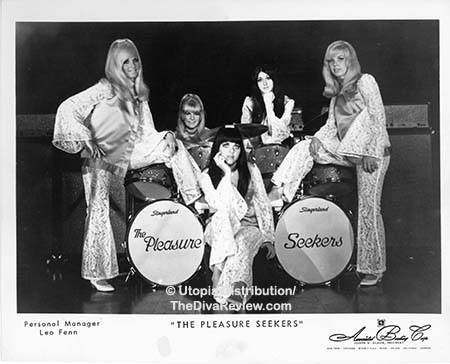 Then
what really spurred me on, besides all the being in the bands and
learning your craft: When I got discovered, and I got taken to England,
and I was always waiting for it, because I knew would happen. Donít
forget, the band that {producer} Mickie Most saw me in, I was in
the background. My sisters had pushed me in the back. Nancy was the
lead singer, they had pushed me in the back. I went up, I do two songs,
and bang, I had my solo offer.
Then
what really spurred me on, besides all the being in the bands and
learning your craft: When I got discovered, and I got taken to England,
and I was always waiting for it, because I knew would happen. Donít
forget, the band that {producer} Mickie Most saw me in, I was in
the background. My sisters had pushed me in the back. Nancy was the
lead singer, they had pushed me in the back. I went up, I do two songs,
and bang, I had my solo offer.
One of the pivotal moments in my life, and I couldnít have done the
documentary, and indeed the movie, you know Iím doing a movie of my
life, now, too? The script will be done in July, because this
documentaryís gone ballisticÖ But I must ask you, what did you think of
the Thanksgiving tape?
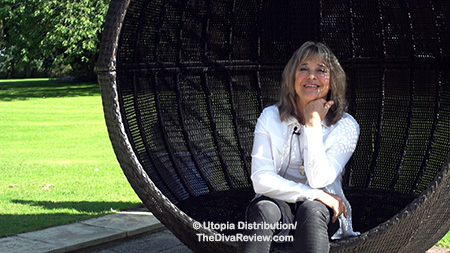 LMD:
My sense was itís clear that while your father loved you very much, he
was very angry, and sent you that tape to say, ĎThis is how we will go
on without you.í
LMD:
My sense was itís clear that while your father loved you very much, he
was very angry, and sent you that tape to say, ĎThis is how we will go
on without you.í
Iím sure he probably didnít realize how badly it affected you, but I thought it was almost monstrous. There you were, a young woman, alone in a foreign country, where you knew all of two people, and he sends you this?
SQ: What did you think you did to me? I was 21, I had left home with no money and no friends. All I had was my contract and my dreams. I couldíve failed. I was scared and lonely, crying myself to sleep. I had to leave half of my money home, because my dad said I owed money. So, I was stealing food from the kitchens.
Then I finally get this tape and I was all excited, and I went upstairs to hear the family, and I put it on, and this is how they feel about me? It was orchestrated, my dad orchestrated it.
A lot of people have given me their opinions, itís also going in the movie, because itís a pivotal moment in my life. That was sink or swim. That tape couldíve killed me. It couldíve killed me. But at the end of the crying and all, I went, ĎRightÖ Right! Watch me.í
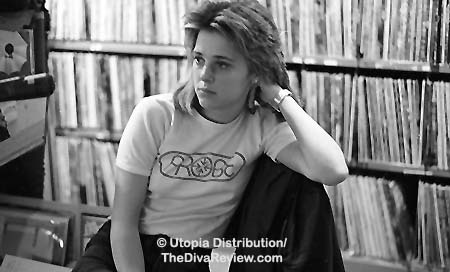 LMD:
Do you think he knew that might be your reaction? Why do you think he
did it? Did you ever ask him?
LMD:
Do you think he knew that might be your reaction? Why do you think he
did it? Did you ever ask him?
SQ: Oh God, now thereís the real dichotomy. My scriptwriter and I talked about it for ages. I have an inquiring mind; I like to know what makes people tick. Even my own things, I always try to work out where they came from. I had ample opportunity, because it was my father who put the tape on: I donít think anybody knew they were being taped, but he orchestrated it and ran the conversation. Every time he came to see me here, I had ample opportunity to ask him. I kept the tape in the drawer. I didnít one time ask him, and I think ĎWhy?í Maybe I was afraid of the answer? Maybe it was just best to leave it in the background, or maybe I needed that to keep pushing me. Who knows? I couldíve asked him, but I didnít. My scriptwriter asked me, ďWhy didnít you?Ē I said, ďI donít know.Ē I donít know the answerÖ
I remember one time sitting at the kitchen table, we were talking. I remember because that was the moment if I couldíve brought it up, I wouldíve done, but I didnít. And he said something or other to me that was a little bit hurtful, and I said, ďDad, what you just said hurt my feelings.Ē And he looked at me and he said, ďSusie, godammit, youíre going to have to toughen up.Ē I looked at him, and I went, ďHow?Ē Nothing was said after that. Maybe thatís my answer. That has to go in the film; ďHow?Ē
Anyway, that spurred me on, and it was very difficult hearing what my two sisters said. The older one, who Iím very close with, sheís a fan, and sheís not ashamed to be a fan. While my younger sister said, ďI will never be her fan.Ē Why? If it were any of them, Iíd be their biggest fan. It was so stupid. Anyway, I left all that, and because I said to my director when we started the project, ďEven though I have editing scissors, I promise you, if itís true and itís important to the story, even if Iím cringing, hurting, or dying; itís in the film.Ē So, I wasnít involved in the interviews, obviously. It was done by the director, and so I heard this, and I went, ďOkay. Okay.Ē
LMD: So, in some ways, it was like the Thanksgiving tape all over again?
SQ: Yes! I kept that tape all these years, and I see the real thing, larger-than-life on the big screen. Nobody can hide when itís on the screen. You see every nuance. You see every change of eye shape. You see everything. So, itís been a real learning curve for me. It wonít change how I am, I feel that I mustnít lose that sensitivity that I have. I mustnít lose that hurt that I have, because itís what keeps me real.
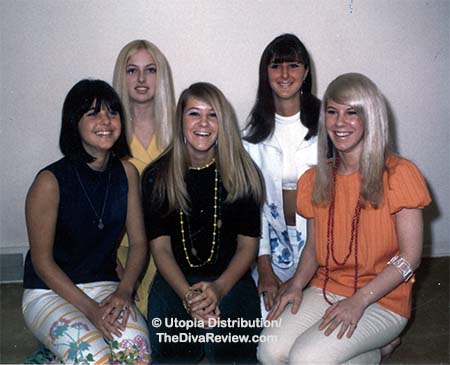 LMD:
So, you had the right to edit and you didnít use it. As someone whoís
been a professional performer since age 14, what was it like for you to
be seen through this very different lens, under the microscope of a
documentary?
LMD:
So, you had the right to edit and you didnít use it. As someone whoís
been a professional performer since age 14, what was it like for you to
be seen through this very different lens, under the microscope of a
documentary?
SQ: Luckily, I am very real, and I am very open and I am very feet on the ground. Liam {Firmager}, the director said to me, when we got near the end of the film, ďSuzi, I just want to tell you something. Iíve done lots of different things with lots of different people; different documentaries with lots of famous people. Nobody that Iíve ever talked to has given me what youíve given me.Ē I guess he meant a piece of myself. I did open up totally. I was naked in that film, and it really does it to you.
At my first premiere in London, I was nervous because I hadnít seen it on the big screen, and I hadnít seen it with an audience; and thatís when you really gauge the effect. You feel what theyíre feeling. You hear the noises, the gasps, the applause, and Iím going, ďOh, Jesus Christ.Ē I was nervous. So, I snuck in right at the end, crouched down. Iím hearing the gasps; they came right when I thought they would. Iím hearing the sobs that came right when I thought they would. Iím watching the screen the whole time in tears, because itís touching. I was humbled by what people said. I was surprised by what some people said. I kept thinking, ĎMy God, I did all that?í
There was one funny moment, and I think you wouldíve loved it, but he said, ďNo, youíre not doing that.Ē Debbie Harry is a friend of mine, I love her. When she says {Affects airy voice} ďAnd Suziís so beautifulÖí I wanted to put a voiceover that said ďFuck off, Debbie.Ē {Laughs} I mean, but how could Debbie Harry tell me that? I mean she was an iconic beauty. So, the documentary taught me a lot.
 LMD:
One of the things you mention in the documentary is being surprised that
there hasnít been another you on the music scene.
LMD:
One of the things you mention in the documentary is being surprised that
there hasnít been another you on the music scene.
SQ: No. Because can there be? I donít think so. I know myself, how strange it all is. I know I donít fit in any area, exactly, and I had to define my own, and I did.
I asked a lot of people for this, and I want this from you. For the film, Iíve got this word cloud: friends, famous, not famous, various family -- family has not respondedÖ. In fact, my two sisters have not been in touch with me since the film has come out. They just have not contacted me -- but anyway, I have this word cloud, and Iíve asked everybody that I know to have three words to describe me. As it works in the word cloud, the word thatís said the most is the biggest in the middle -- and itís a big word cloud -- and the biggest one in the center for about five months, and it hasnít changed, is ďdetermined.Ē Everybody says that word.
I hope that when people watch this film, that they go away knowing me, understanding me. Itís been a big thing all my life; ĎDonít you get me? Donít you understand me?í And thatís the one thing that hurts: If somebody doesnít understand, I go, I will stand on my head and spin wooden nickels until you understand. Then make up your mind, but at least get what Iím saying, and take it away and do what you like with it. I wonít be misunderstood and I wonít be ignored, either. I will not be ignored.
I asked my husband for the three words and he said, ďYouíre a one of a kind. There are no words.Ē
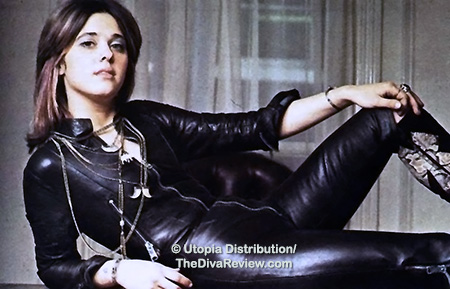 LMD:
Perfect segue, because all through the doc, I had been wondering whether
there was actually a balance between your public image and your private
self?
LMD:
Perfect segue, because all through the doc, I had been wondering whether
there was actually a balance between your public image and your private
self?
Toward the end of the film, you say to your husband, ďMaybe I was a pin-up, but the pin-up was Suzi Quatro.Ē What did that mean?
SQ: It means, quite easily, that my autobiography was written in two people; and both people are me. Donít kid yourself; both people are me. There is little Susie from Detroit, and Suzi Quatro -- and both people have their say all the way through the book.
So, I do separate Suzi Quatro, thatís that side, and little Susie is here watching everything. I keep myself sane that way. Iím not schizophrenic, and both people are me. Right now, youíre getting both of me; you get little Susie, and you getting Suzi Quatro, but I have that ďEgo RoomĒ in my house, which is kinda how I live my life, itís very important.
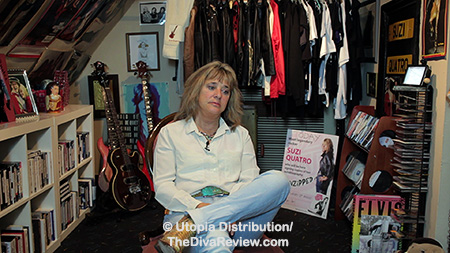 Itís
this old 15th-century house, and thereís an ďEgo RoomĒ and
the top floor, you have to go up this flight of stairs. Itís hard to
get to the ďEgo Room,Ē if you get my analogy: You could bang your head
on the ceiling, you could bang yourself on the wall. You come to a huge
wooden door, and I had a little plaque made, and it says, ďEgo Room,
mind your head.Ē And you go in, and the first thing you see is the red
book, ďThis Is Your Life,Ē from the show they did. Clothes Iíve worn,
bass guitars, posters everywhere, stage passes, videos, CDs, scrapbooks,
pictures on every surface, you could look at everything, and itís the
quietest room in the house. My ďEgo RoomĒ is the quietest room in the
house {Laughs}. You go in there if you want to do something, you
sit there and you meditate, or whatever. The important thing is when
you come out, you shut the fucking door. And thatís how I live my life.
Itís
this old 15th-century house, and thereís an ďEgo RoomĒ and
the top floor, you have to go up this flight of stairs. Itís hard to
get to the ďEgo Room,Ē if you get my analogy: You could bang your head
on the ceiling, you could bang yourself on the wall. You come to a huge
wooden door, and I had a little plaque made, and it says, ďEgo Room,
mind your head.Ē And you go in, and the first thing you see is the red
book, ďThis Is Your Life,Ē from the show they did. Clothes Iíve worn,
bass guitars, posters everywhere, stage passes, videos, CDs, scrapbooks,
pictures on every surface, you could look at everything, and itís the
quietest room in the house. My ďEgo RoomĒ is the quietest room in the
house {Laughs}. You go in there if you want to do something, you
sit there and you meditate, or whatever. The important thing is when
you come out, you shut the fucking door. And thatís how I live my life.
So, if I had taken the pinup. I donít play the looks card, as you know; youíve seen it in the film, itís not what I do. Itís only now at 70, that I can look at some of the little pictures and think, ĎHey, I didnít look too bad,í but I donít play that card. And thank God, because if I had been looks identified, and I became a pinup, what a pain in the ass I would be. So, as it is, you donít take it too hard. You say thank you, but it doesnít go in where I live. Itís just a complement and thank you, fine.
LMD: Thereís a moment in the film that I almost threw a shoe at the screenÖ
SQ: {Laughs} Thatís so funny. Thatís the first time that Iíve heard that.
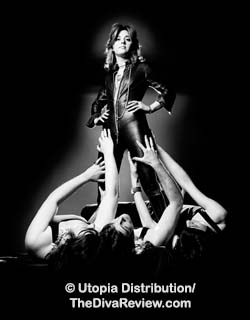 LMD:
ÖItís when TV host Russell Harty turns you around and smacks your
backside. Iím guessing that wasnít the first objectification or assault
you endured. How did you cope with those moments?
LMD:
ÖItís when TV host Russell Harty turns you around and smacks your
backside. Iím guessing that wasnít the first objectification or assault
you endured. How did you cope with those moments?
SQ: That pissed off a lot of people. I donít know if you know, but I had just won ďRear of the Year.Ē Itís a big contest and they do it every year. I have always had a nice ass, to be fair; I try to back into a room when I can. That had just happened, so I was on the show, and of course he said, ďOh Susan, letís have a look at this famous rear.Ē And he was gay, and he didnít do it nasty. He did it kinda cute, but that was a moment that Iíve had to explain at my Q&As.
I am a professional. Thatís the main word with me; I am professional. This was a live television show, okay? He picked his moment: He didnít do it backstage, he did it on camera. And in my head, really like lightning; my instinct was to put my knee in his balls. Thatís my instinct, but real quick, my brain went, ĎLet it go, this is live television.í
Had he done that backstage, he wouldíve been singing soprano for the rest of his life. But he mustíve known my reputation; he mustíve known I was a professional. So, he was clever and picked his moment and I did let it go, because then I wouldíve been defined by that; and maybe some people wouldíve applauded me, some people wouldíve said, ĎYou gotta be kidding, he didnít mean it.í So, youíre playing with all that, so I made a snap decision, I think it was the right one. Heís dead now. But things like this do happen. That wouldnít happen now.
LMD: Thatís what I thought. Was that sort of behaviour just part and parcel of what it was like for you at that time?
SQ: Not me! I have kneed many men in the balls, and Iíve hit many men. The only reason he got away with that, was because it was on camera and we were live. You ask my husband, I have whacked many people, because for some reason, because of I am a little girl, you always get some asshole who thinks he can touch you, and I donít allow it! I donít allow it. Iíve done it many times. I actually hit a guy over the head with my bass one time.
LMD: That enormous Fender?
SQ: Yep. He made a rude gesture at me on stage, so I danced close and I went, ĎWhack!í and he was on the ground. So this guy, this TV guy, he doesnít know how lucky he was. So, no, I didnít like it.
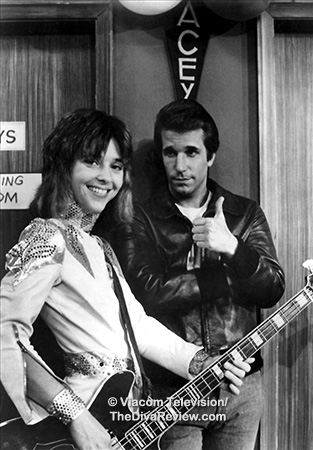 LMD:
One of the things that SUZI Q enlightens us on are your many other lives
as an artist. Obviously, we know you as a singer and bassist. Many
people will know you from HAPPY DAYS, where you pretty much played a
G-rated version of yourself. Yet you didnít really go on to do any more
acting at that time, when that character was so popular.
LMD:
One of the things that SUZI Q enlightens us on are your many other lives
as an artist. Obviously, we know you as a singer and bassist. Many
people will know you from HAPPY DAYS, where you pretty much played a
G-rated version of yourself. Yet you didnít really go on to do any more
acting at that time, when that character was so popular.
In later years, you embraced the theatre as composer and delved further into acting, most notably playing the great Hollywood star, Tallulah Bankhead. Was it your experience on HAPPY DAYS that stirred the desire to act and involve yourself in theatre?
SQ: My main three words are creative, entertaining, and communicating. That was something I was always going to take every opportunity to do in this business. Iím an artiste, thatís what I am. As long as I think I can do it, Iíll do it. I love spreading my wings. I love a challenge. HAPPY DAYS was my first acting job. Then ANNIE GET YOUR GUN? Ethel Merman, are you kidding? I can play that role? Fantastic!
And even my friend, KT Tunstall, when we watched the documentary, she said, ďSuzi, thereís not one of your moves in there.Ē And I said, ďNo, because Iím Annie Oakley.Ē And then TALLULAH WHO? I sent my mother the press photo from the show, and she said, ďWhy didnít they use you for the photo?í I said, ďThat is me.Ē {Laughs}
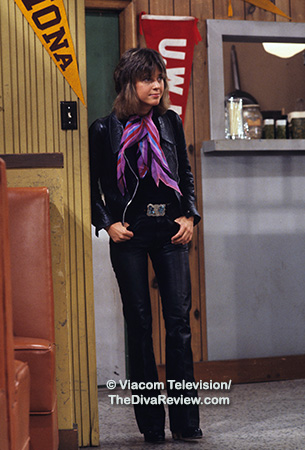 So,
when I act, and Ron Howard said it, too, that donít act; I become the
part. I always wanted to do everything. I turned down the spinoff of
HAPPY DAYS, because I wanted to do other roles. When my marriage was
breaking up, creativity saved me. I just read a book on Tallulah, and I
did find her fascinating, and I thought, ĎLetís write a musical.í Iíve
played piano, I write piano, Iíve done classical, so it was wonderful to
be able to do that and play her. I looked at the marquee and it said
ďWords and music, Suzi Quatro, Shirlie Roden. Tallulah played byÖĒ And
I went, ĎWow, how satisfying. I wrote the words and music and I played
the character.í
So,
when I act, and Ron Howard said it, too, that donít act; I become the
part. I always wanted to do everything. I turned down the spinoff of
HAPPY DAYS, because I wanted to do other roles. When my marriage was
breaking up, creativity saved me. I just read a book on Tallulah, and I
did find her fascinating, and I thought, ĎLetís write a musical.í Iíve
played piano, I write piano, Iíve done classical, so it was wonderful to
be able to do that and play her. I looked at the marquee and it said
ďWords and music, Suzi Quatro, Shirlie Roden. Tallulah played byÖĒ And
I went, ĎWow, how satisfying. I wrote the words and music and I played
the character.í
So, yes, I love it all. Poetry is something Iíve done since I was a little girl. I love writing. I love radio. I was one of the most popular DJs for 15 years on BBC Radio 2. I had my own talk shows. I played many different roles on many different TV things. Iíve just finished an illustrated lyric book, which is going to be similar to my poetry book, which comes out in July. Itís called ďThrough My WordsĒ instead of ďThrough My Eyes.Ē Iíve written another book, and Iíve written 14 new songs for the next album with my son. So, this is me. This is what Iím here to do.
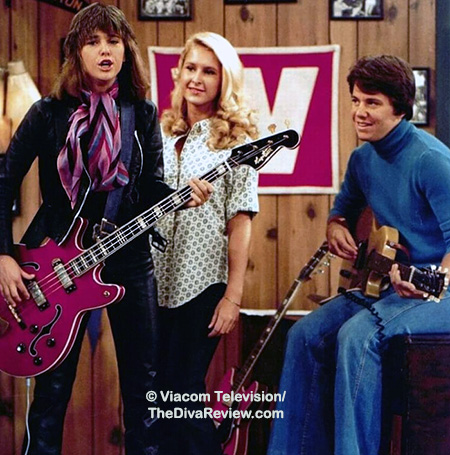 LMD:
Iím a fan of a Japanese electro-pop group called Polysics that does an
excellent version of ďThe Wild One.Ē Talking with them and other
artists from Japan; they know your catalog extremely well. Watching the
doc, and seeing how revered you are there, in Europe, in Australia, what
did they get that the US didnít?
LMD:
Iím a fan of a Japanese electro-pop group called Polysics that does an
excellent version of ďThe Wild One.Ē Talking with them and other
artists from Japan; they know your catalog extremely well. Watching the
doc, and seeing how revered you are there, in Europe, in Australia, what
did they get that the US didnít?
SQ: I think a lot of the famous people in the film address this really well. It seems to me now that Iím watching it back, because I did lots of tours in America. I sold a lot of albums, everybody knew who I was, but then I did HAPPY DAYS. In the early days, when I was there {In the US}, and having all this success over here {In the UK}, I think they were a little bit stuck on The Eagles, and almost this middle-of-the-road kind of thing, and they werenít quite ready for me. And it wasnít until I did HAPPY DAYS, playing a character like myself, Leather Tuscadero. So, either one, whether itís Suzi, or Leather, who knocked down the door, theyíre both me. I played Leather.
So, I think it was Debbie that said it was a little bit too early, maybe it was. But whatever, it opened the door; once you saw that HAPPY DAYS, everybody accepted that as a reality.
LMD: Weíre talking
on the occasion of another very famous bass playerís birthday, Sir Paul
McCartney...
SQ: Iím
on the air at 9 to wish him a happy birthday.
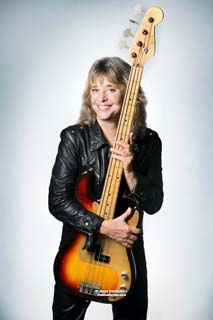 LMD: Excellent!
Heís my favourite musician of all. Speaking of bass players, who are
your favourites?
LMD: Excellent!
Heís my favourite musician of all. Speaking of bass players, who are
your favourites?
SQ: {James} Jamerson is number one. The Motown Funk
Brothers; he is beyond. I am a friend of Paulís. He is a very
good bassist, but heís more a guitar player playing bass. Thatís how he
plays bass. Cos he started on guitar, and then they put him on bass,
you see? I never started on guitar, I went to bass. Thereís a
different attitude. Just a slightly different attitude, but he plays
very nice melodic lines, he does. Heís very good. I love the bass
player from Canned Heat {Larry Taylor}. And I love Flea from the
Red Hot Chili Peppers, heís one the best.
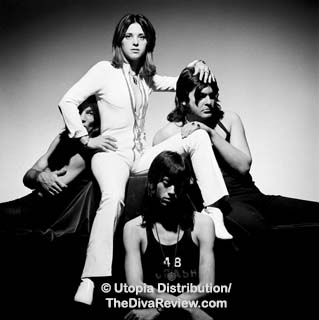 LMD:
Hereís a question Iíve always pondered; where did you get those glorious
leather catsuits?
LMD:
Hereís a question Iíve always pondered; where did you get those glorious
leather catsuits?
SQ: I always had them made. And the glorious thing about that is, that at age 70, Iím still wearing them on stage and how cool is that?
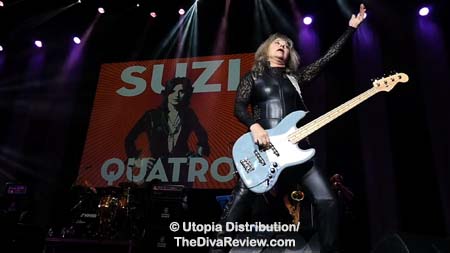 LMD:
Okay, so when is your fitness video coming out?
LMD:
Okay, so when is your fitness video coming out?
SQ: Well, you know, Iíve always liked to look a certain way. When I go on stage, I always announce my age, because Iím proud of it. I just like to look a certain way. Iím not chasing 50. Iím not chasing 40: Iím 70. Iím happy to be 70.
My secret is, I donít give a shit. Itís really easy. I donít give a shit. I rarely wear makeup. Iím on camera a bit tonight, so Iíve had to put little bit on, but Iím not a makeup girl as such.
 LMD:
Now that youíve hit Platinum (birthday) at age 70, what are
words youíd like to leave us with as you head into the next
septuagennial?
LMD:
Now that youíve hit Platinum (birthday) at age 70, what are
words youíd like to leave us with as you head into the next
septuagennial?
SQ: I would say Iím going to kick ass until I donít have an ass to kick. {Laughs}
~ The Lady Miz Diva
June 18th, 2020
SUZI Q is available on VOD and DVD from July 3rd, on https://www.altavod.com/movies/suzi-q
Click Here for our Exclusive
SUZI Q Interview with
Fellow Rock Legend, The Runaways'
CHERIE CURRIE.
© 2006-2022 The Diva Review.com
|
|































